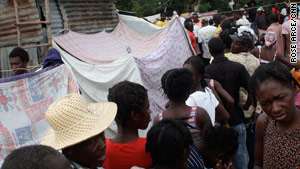Red tape, bad traffic, no power: 'That's Haiti'

- CNN's Soledad O'Brien and her crew return to Port-au-Prince more than a month after quake
- "That's Haiti," people say when things move slowly, electricity stops, traffic mysteriously halts
- Doctor who came for six days to treat 300 a day, waits three days or more for supplies
- "We were bringing in medical equipment as well as medicines and we have nothing," doc said
Port-au-Prince, Haiti (CNN) -- You hear it all the time in Port-au-Prince: "That's Haiti," people tell you when things move slowly, when the electricity goes off or traffic mysteriously comes to a halt. Some say it was like that even before a devastating earthquake reduced most homes to a few hours of power from a generator and made some streets impossible to pass.
Today we followed a group of American relief workers to the airport to pick up several tons of donations. They were expecting tents, food, heavy equipment to help them rebuild and repair. Relief supplies had been flowing freely from the airport since the earthquake. Rescue workers had been able to avoid customs delays and taxes imposed on foreign imports.
But when we arrived at the airport, the whole system had been upended. A doctor from Milwaukee was screaming through a fence at customs officials. She had come for six days with plans to treat 300 patients a day. She had been in Haiti three days and her medicine was still being held. "We were bringing in medical equipment as well as medicines and we have nothing. We don't have anything to see the patients we're supposed to see," she said.
Customs would not budge. They showed us an order from the Ministry of Economy and Finance outlining a new procedure for getting supplies into the country. Organizations now have to sign over the goods to the Haitian Department of Civil Protection which will review their request to get a tax exemption before releasing the goods. We called the ministry and they told us the government is trying to prevent businesses from getting goods in tax free under the guise of being relief organizations. They are after crooks and people sneaking in contraband.
 Video: Haiti slows relief supply flow
Video: Haiti slows relief supply flow
But Terry Nelson from Light Ministries said he was told the only way to get his tents is to pay the tax. "We're giving stuff away. We've been here for 28 years and we have to pay to help their people," he said. He did not know the cost. "I'm trying to find out," he said. We left him there waiting on 250 tents on a week it had started to rain.
Bill Manassero of Maison de Lumiere came to pick up 6 tons of donated goods and was told it could cost him as much as $10,000 unless he was willing to sign it over to the government and await approval. "We had a bunch of things shipped to us to help repair houses, tents to give away to people who need homes and right now we can't get our things out of customs because they're telling us we have to take all the things that are ours and declare it over to the government and give it to them as a gift and they will give it back to us at some point -- we don't know when," he said.
No one trusted they would get their goods back. And no one has time to wait. The Maison volunteers leave at the end of the week. So if Manassero waits, he may not get his cement mixer in time for his volunteers to rebuild his wall. He's in the same boat as the doctor who may not be able to treat her patients. The government says they have changed the rules because the "emergency situation" is now over. But it's not over to them.
I asked customs to explain why this new process is stalling relief work. "I just want to understand why people when they come to get their things have to pay so much money. Why a tax? It seems if you're donating things like tents or food they should just be donated. There's not one person in this building who can answer the question why tents can't be donated," I repeatedly asked the customs director. No answer. That's Haiti.








